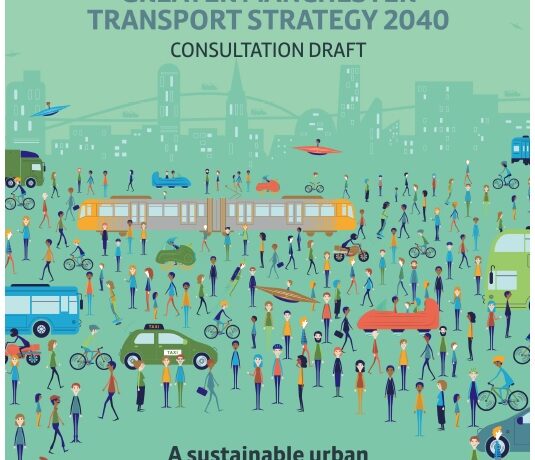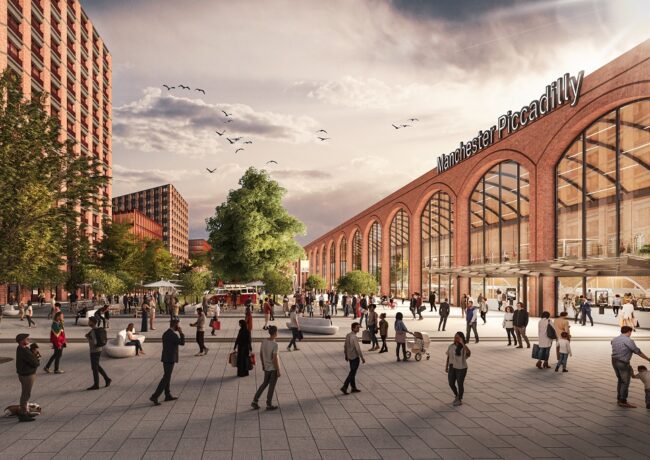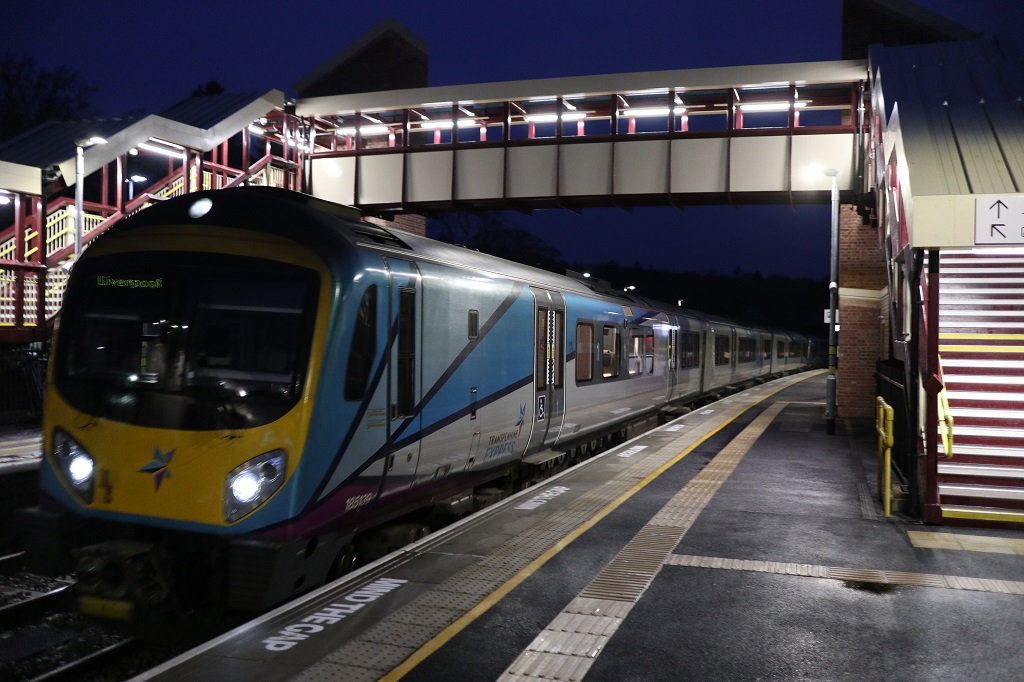TfGM 2040 strategy responses published
More ambitious cycle routes, fears for personal safety on public transport and overcoming disruptions to tram services were among the concerns fed back by respondents to Transport for Greater Manchester’s 2040 strategy.
Roughly 1,800 residents, businesses and stakeholders submitted comments during the 12-week consultation held over the summer. The Greater Manchester Transport Strategy 2040 will be revised and resubmitted before the end of the year following the consultation feedback.
According to a report put before tomorrow’s Greater Manchester Combined Authority executive committee meeting, the main points arising from the consultations were:
- “Clear support for better integration of transport system, with a strong degree of support for facilitating easier and more cost-effective multi-leg or multi-modal journey
- “…resilience of the transport network is seen as being of critical importance, as are the funding challenges of delivering improved transport infrastructure and services
- “…easier orbital travel around the city-region
- “Concerns over bus service reductions
- “…strong desire from cyclists for a more ambitious approach
- “Challenge of improving perceptions of personal security, particularly on public transport”, late night trains in particular
- “…importance of considering the needs of motorcyclists, private hire drivers and people with all types of disability”
The report also spells out in greater detail the responses related to each type of transport.
Rail users complained about difficulty moving between different modes, asking for more flexible fares and ticketing.
Similarly, bus passengers said pricing was inconsistent and moving between services was limited. They also raised concerns over specific bus services being reduced or withdrawn and bus service reliability.
Metrolink users raised concerns over pricing, capacity and reliability. They requested later running weekend services and more car parking to be provided at Metrolink stops. There were suggestions for various proposals for future potential Metrolink network expansions and especially between GM towns around the M60 orbital.
Drivers were bothered by disruptive road works and use of bus lanes and the perceived reduced capacity for other road users.
Under “active travel”, or walking and cycling, the report draws out points about “significant concerns about road safety” and “quality, capacity and security of cycle storage”, as well as calling for cycle education and training and the “importance of learning from best practice cities in Europe and elsewhere in terms of improving the provision for pedestrians and cyclists.”
The report added: “TfGM officers are undertaking further detailed analysis of this feedback to consider the implications for refinement and delivery of the final 2040 strategy.
“There is also a continuing review and analysis being undertaken to ensure the final 2040 strategy aligns with the latest iteration of the merging Greater Manchester Spatial Framework.”
Both TfGM and Network Rail are considering options to open up land for development alongside tram and railway lines.
- Find more at TFGM 2040 website





Expect massive public funding to continue for rarely used bus lanes and cycle lanes. Meanwhile the majority of us continue to suffer in traffic jams and over crowded rail carriages. By-passes, road building and significant increase in rail carriages should be the priority for me. Alas our transport leaders never seem to prioritise the masses. We hammer London but at least they identify spend to get the most bang for their buck. We need ambitious schemes which reduce journey times and improve capacity.
By NC
We need to integrate all GMs outer areas with each other.The Metrolink needs a circular line and people should be able to get from Bury to Rochdale for example without traipsing to Victoria first.I hope Andy Burnham prioritises fares immediately,as they are extortionate. I travelled from Central London to Barnet for a pound last year on Aviva,which operate expensively on Merseyside(No prizes for guessing where they make the shortfall up from cheap London fares).That is the same distance as Manchester to Oldham.On First Manchester you can pay over 2 pounds for 3 stops.It just isn’t good enough,that we are exploited in this way.I hope that he brings transport under the jurisdiction of GM councils and we get the same deal as London.Nobody will leave their cars at home,until they start charging a fair price.It might not be a bad idea to incorporate Merseyside and GM under one publically owned transport scheme.
By Elephant
Bus lanes are higher capacity than car lanes and so are a more efficient use of road space. Better regulated bus services together with fewer pinchpoints and more park and ride facilities will enable many many more people to access employment and services in the city centre than a standard car lane. It’s basic common sense.
By Bussed
Most of the traffic jams seem to be full of cars with only one person in, and that includes myself. Perhaps that is the issue?
By Nordyne
How can bus lanes be a more efficient use of space? On a single road a car lane takes far more people by car than it does by bus. The bus lanes have capacity but it is capacity which isn’t used. Trying to change people’s behaviours is all very well but at some point you have to recognise the majority won’t change and you need to cater for the masses. The bus system is heavily subsidised for a reason – because not many people want to travel that way.
By NC
Bus lanes would be great if buses were in queues, but queues of cars in one lane going nowhere, whilst one bus has a lane to itself is plain ludicrous. The situation on Rochdale road for instance is farcical. Don’t start me on Cycle lanes. It appears to MCC that cyclists needs are far more important than the disabled around Wilmslow road, Rusholme, where cycle lanes are as wide as the M6 and the pavements are not wide enough to push a wheelchair on. However many lanes given to these cyclists,so many still love to ride dangerously on the pavements.
By Elephant
Bus lanes are a more efficient use of limited road space because a bus is a higher capacity form of transport than a car. You need many many cars to match the capacity of a single bus but in order for buses and bus lanes to be able to maximise that capacity they need to be running at a reasonable frequency and be reasonably full at peak times.
Most already do this and most bus lanes only exist on the busiest corridors and operate during peak times however they could be even better utilised. To do this we need more park and ride facilities, more continuous lanes, removing pinch points where they have to mix with general traffic and probably a few more limited-stop express services like the popular X92 that runs from Stockport through to Manchester.
This is basic common sense. You simply can’t increase the number of cars getting into Manchester at peak times without compulsory purchasing vast amounts of property to widen roads, in other words, something that is economically unfeasible nor desirable either socially or environmentally. The only realistic solution, if we want our city to continue to grow is to increase the peak time capacity of our existing road infrastructure and that, in most cases means more and better bus lanes.
The manifest success of the Leigh guided bus with its segregated continuous bus lanes, high quality vehicles, park and ride and high frequency demonstrates this principle very well with the service operating at capacity already and people choosing to leave their cars at home and switch to the service; the bigger picture being more people are able to access more jobs, enabling our economy to grow.
By Bussed
Actually a bus with average peak time occupancy need only run at 6-8 minute intervals to exceed the capacity of a car lane with average peak time occupancy (i.e. one person per car). Most bus lanes on most corridors will easily achieve this.
By Bussed
Every bus only needs to accommodate 2 people to be a better use of space than a car.
Bus operators do not “cross subsidise” cheap London fares with expensive regional ones. They are businesses and want to make a profit on each route. Therefore, making a loss in London would not make sense. Higher patronage per mile makes economies of scale possible, while regulation of fares in London (which does not exist elsewhere) keeps fares sensible.
Buses aren’t “heavily subsided” – the majority of routes are commercially run for profit, hence the fares are expensive. If more people used the bus instead of driving, fares would be lower and services would be more expensive. TfGM is doing the logical thing by proving the infrastructure (i.e. bus lanes, bus priority) to make bus travel attractive.
By TransportGuy
If they have to ask….then we might as well give up now…..
By Mizzer
Mizzer – its a consultation. That doesn’t mean they have to take account of every angry motorist’s narrow minded viewpoint; mearly listen. If you have an opinion on this, its an opportunity to air it.
By PrincipalConsultant
You’ve disqualified yourself from taking any further part in this thread by stating the following “…..angry motorist’s narrow minded viewpoint…..”. You need to go and take off your Barbie pyjamas.
But, lets take this gem that this expensive report has thrown up: “Clear support for better integration of transport system, with a strong degree of support for facilitating easier and more cost-effective multi-leg or multi-modal journey”.
I heard that one in the 1972 report, the 1981 report, the 1992 report, the 2001 report. Why am I hearing that crap again?
If they have to ask….then we might as well give up now…..
By Mizzer
Thanks, but there isn’t a qualification process to comment.
Yes, “clear support for better integration of transport system…”. Do you happen to know somebody who wants a more disintegrated transport system? goth.
By PrincipalConsultant
This isn’t about somebody who wants a more disintegrated transport system. Stop making up silly things.
There’s been a “clear support for better integration of transport system…” for 40 years. Why do they need to keep finding that out…again, and again, and again. There never wasn’t a “clear support for better integration of transport system…”. How many times do we need to know that? I’m fed up of hearing it.
I don’t know why you get so supportive of regurgitated rot. You’re encouraging ’em. You’re part of the problem.
By Mizzer
I’m part of what problem? Is it a problem that the aim of integration of transport systems has remained consistent? Surely it’d be a problem if the aim was all over the place for the last 30-years.
Hasn’t been delivered fully because of funding. Obviously massive strides in the last few years. Local support gives more weight to bang on the door of the good ol’ UK government.
By Bank of Mumandad
Exactly! The aims have remained consistent for 30 years because they’ve never been resolved; consistency in that context is nothing to be proud of.
30 years of failure isn’t good just because it was nice and consistent failure.
Sack ’em.
By Mizzer
Sack who exactly? Do you think the people in charge now are the same people as 30 years ago?
By Bank of Mumandad
I think Manchester was a different place 30 years ago and this plan looks towards the next 25 years. Its not just about solving existing problems, its also about how we accommodate massive growth across the city with even more people wanting to travel into and around the city/conurbation than there is now. The existing system won’t cope with that. This plan is not about “still trying to solve a problem generated 30 years ago”. The consultation is a democratic process – what do the people want?
By Roe Digger
Bank – Sack any clown that thinks “Concerns over bus service reductions” or “…easier orbital travel around the city-region” needed a consultation to find out. Those issues were raised in 1994.
Roe – Manchester might have been a different place 30 years ago, but the transport concerns back then were not dissimilar to today. Why do we need another glossy report? The only thing good about it is the LS Lowry-style cover artwork?
By Mizzer
Mizzer – you do understand, don’t you, that TfGM HAS TO consult? As someone else stated, it is part of the democratic process. Its a good thing that people get to have their say.
By Bank of Mumandad
He/she would probably whinge if they weren’t consulted
By Nordyne
Who’s Nordoyne?
By Mizzer
Can I please let you know that the Dolt referring to the closure of the M60 is not me. It appears that I will have to refrain from commenting on this sit
By Elephant
On this site from now as somebody seems to take an almost psychopathic pleasure in misquoting me. It has been fun folks.
By Elephant
Oh no mate Elwphant!!! I will miss your comments on almost every story! You were the one commentator that made it more like the MEN, fun n intelligent to read!
By Giraffe
Elephant – Previous comment has been removed.
By Jessica Middleton-Pugh
I think it’s Elephants lighthearted sense of humour, optimism and open-mindedness I will miss the most.
A very sad day for the PNW community. RIP.
By Rhino